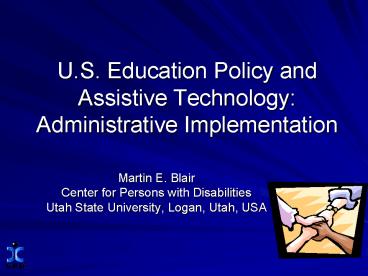U'S' Education Policy and Assistive Technology: Administrative Implementation - PowerPoint PPT Presentation
1 / 35
Title:
U'S' Education Policy and Assistive Technology: Administrative Implementation
Description:
Utah State University, Logan, Utah, USA. Assistive Technology in the USA. AT Policy ... 1988 Technology-related Assistance for Individuals with Disability Act ... – PowerPoint PPT presentation
Number of Views:28
Avg rating:3.0/5.0
Title: U'S' Education Policy and Assistive Technology: Administrative Implementation
1
U.S. Education Policy and Assistive Technology
Administrative Implementation
- Martin E. Blair
- Center for Persons with Disabilities
- Utah State University, Logan, Utah, USA
2
Assistive Technology in the USA
3
AT Policy Discussion
- Effective and efficient administrative
infrastructure - Mistakes in U.S. implementation
- Administrative recommendations for developing an
effective AT infrastructure
4
(No Transcript)
5
(No Transcript)
6
(No Transcript)
7
(No Transcript)
8
IndependencE
9
Education
AchievemenT
10
Education
OutcomeS
11
Brief History of AT in Education
- 1975 Education for All Handicapped Children Act
- 1982 Technology and Handicapped People
- 1988 Technology Dependent Children Report
- 1988 Technology-related Assistance for
Individuals with Disability Act (renewed in 1994,
1998 and 2004 as the Assistive Technology Act) - 1997 Individuals with Disabilities Education Act
(renewed in 2004)
12
(No Transcript)
13
Assistive Technology is
- Device OR service to
- increase, maintain, or improve an academic
and/or functional area identified for students
with disabilities. (Castellani, et al., 2005)
14
Current LawIDEA 2004
- AT devices or services must be provided if
required as part of - Special Education
- Access to the curriculum
- Related Service
- Therapy, transportation, recreation, social work,
health - Supplementary Aid or Service
- Device
15
Administrative Infrastructure
Leadership
16
Administrative Infrastructure
- Management Planning and Procedures
17
Administrative Infrastructure
- Supervision Skill Development, Collaboration,
and Accountability
18
Administrative Infrastructure
- Program Development Training and Resources
19
Administrative Infrastructure
- Funding to achieve outcomes
20
Administrative Infrastructure
- Outcomes
21
Mistakes in the U.S. System
- Leadership
- Problem 1 Service systems bound by age-specific
and disability-category criteria. - Problem 2 A national vision of AT
implementation is not shared. - Problem 3 Technology development standards
result in incompatibilities in hardware and
software applications.
22
Mistakes in the U.S. System
- Management
- Problem 4 Policies and procedures for
implementing AT in education settings are not
consistent. - Problem 5 Consideration of AT in every IEP is
not defined consistently across school settings.
23
Mistakes in the U.S. System
- Supervision
- Problem 6 Due to varying policies, AT services
are implemented inconsistently across the nation
which likely results in students not receiving
the full range of benefits that AT may provide.
24
Mistakes in the U.S. System
- Program Development
- Problem 7 Educators are unaware of the various
types and applications of AT. - Problem 8 Competency-based teacher training is
new. - Problem 9 Education-based AT training is
targeted only to special education teachers. - Problem 10 The majority of AT specialists in
schools are trained in related therapy services. - Problem 11 Inadequate training in AT assessment
and evaluation.
25
Mistakes in the U.S. System
- Funding
- Problem 12 Data describing the amount of
funding available for AT in local and state
education agencies is not comparable. - Problem 13 Funding for AT devices is often
restricted to the specific program from which the
AT was purchased.
26
Mistakes in the U.S. System
- Outcomes
- Problem 14 AT outcomes are not well defined.
- Problem 15 Large scale educational outcome
initiatives funded by the federal government do
not include AT as an important research topic
worthy of critical examination.
27
Administrative Recommendations
- Develop a vision of what the AT system should
look like (components). - Develop outcome statements related to system
development and implementation, and student
achievement. - Create consistent AT policies and procedures that
can be implemented nationally. - Develop a combined AT/IT infrastructure.
- Disseminate AT outcomes across the system.
- Develop a consistent set of AT competencies and
training standards. - Improve data collection to ensure that AT is
implemented in an evidence-based manner.
28
Administrative Recommendations
- Recommendation 1 Develop a vision of what the
AT system should look like (components).
Leadership Management Supervision Program
Development Funding Outcomes
29
Administrative Recommendations
- Recommendation 2 Develop outcome statements
related to system development and implementation,
and student achievement.
30
Administrative Recommendations
- Recommendation 3 Create consistent AT policies
and procedures that can be implemented
nationally.
31
Administrative Recommendations
- Recommendation 4 Develop a combined AT/IT
infrastructure.
FOCUS
32
Administrative Recommendations
- Recommendation 5 Disseminate AT outcomes across
the system.
33
Administrative Recommendations
- Recommendation 6 Develop a consistent set of AT
competencies and training standards.
34
Administrative Recommendations
- Recommendation 7 Improve data collection to
ensure that AT is implemented in an
evidence-based manner.
35
Leadership































